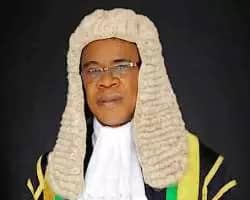“Where else in the world would it be done except in Nigeria where judgement was given in 2010 for a case commenced in 2001 and appeal on the matter dismissed twice by the Court of Appeal and the judgement debtor files and refiles appeal in the Supreme Court, all in a bid not to comply with the judgement of Court This is a terrible situation”.
….Justice Inyang Ekwo
Seeking justice in a Nigerian court is not an option many people will want to explore. The court system has earned the unenviable reputation of allowing cases drag on for years to decades, forcing some litigants to seek self-help. Others lose their life’s earnings in pursuit of justice. And for some, the tragedy of death pulls the plug in their judicial sojourn.
It is worse when the legal issues involve a corporate behemoth, presenting an uneven battle and diminishing the chances for the poor man or woman to access and secure justice.
This has never been truer in the various legal battles by local environmental activists, poor fishermen, farmers and community dwellers suffering the impact of oil exploration by oil multinationals operating in Nigeria’s Niger Delta.
But the conspiracies are sometimes much deeper than the court’s peculiar weaknesses. It sometimes involves underhand methods deployed by big law firms hired by the multinationals to exploit the flaws and manipulate the shortcomings in the judicial system in order to frustrate and even bend the hand of the judges. As a result, litigants are stretched to the point of frustration and forced to abandoning their cases.
This is why multinationals have consistently preferred fighting it out in Nigerian courts than allowing the case to be filed in foreign jurisdictions where insidious influences would likely not hold sway.
This was exactly what happened when a Nigerian lawyer and activist Chima Williams began his multimillion dollars lawsuit on behalf of poor farmers against Anglo-Dutch oil giant, Shell over spills from underground oil pipelines in Ikot Ada Udo, Goi and Oruma, three impoverished communities in the Niger Delta. The spill badly damaged their farmlands, pushing the poor locals further into the cracks of poverty.
But it was a Dutch court that opened the possibility for access to justice when in January 2021, the Court of Appeals in the Hague, Netherlands held that Shell Plc and by extension its Nigerian subsidiary, Shell Nigeria Development Company (SPDC), can be held accountable for pollution in Nigeria.
The decision effectively reversed an earlier ruling in which Shell had argued that it cannot be held liable for infractions committed by its subsidiaries abroad.
In Nigeria, however, some judges have taken similar courageous stance, despite immense pressure and even intimidation from the oil multinationals and their representatives.
In June 2010, Justice Ibrahim Buba of the Federal High Court Asaba, delivered a landmark judgement in a case instituted by Chief Isaac Agbara and nine others (for themselves and on behalf of the ancient “Onne Eh Ejama” stool in Eleme Local Government Area of Rivers state).
This was a case that highlighted the longstanding pollution perpetrated by Shell on the communities within the area complained of. Court filings show that the cause of action complained of began as far back as 1970.
Attempts by Shell to extricate itself from liability using the statute of limitation was defeated by an amended statement of claim filed before the court which showed that the case was predicated upon Shell’s “continuous nuisance and that it is subsisting even till this day”.
These included the crude oil spillage from Shell’s Trans-Niger Oil Pipeline which transports crude from oil wells to the Bonny Terminal for export.
It took nine years for the case to be decided at the trial court with an award of over seventeen billion naira (N17, 180, 257, 831.00 ) against Shell. This included ten billion naira awarded as punitive damages for inconveniences, acid rain, pollution of underground water and hardship, plus deprivation of right to sustenance. The oil giant was also ordered to de-pollute and rehabilitate the environment.
If the journey to secure judgement was difficult, the journey to enforce it has even been more cumbersome, with Shell pulling out all the stops and lining up some of the biggest law firms in Nigeria to ensure the affected communities do not get compensation. It filed an appeal before the Court of Appeal which was struck out, leading it to file a further appeal to the Supreme Court.
In 2019, the judgement creditors commenced fresh moves to enforce the judgement with a garnishee proceeding filed before Justice Inyang Ekwo of the Federal High Court Abuja. Listed as respondents were Central Bank of Nigeria as Garnishee and First Bank of Nigeria Ltd as Guarantor/Surety/Debtor. Shell Petroleum Development Company Limited subsequently applied to be joined, and were joined by an order of court on October 21, 2019. Their agenda was simple, to have the judge set aside the Garnishee Order Nisi issued on June 3, 2019 of the sum of N182, 768, 696, 651.00, calculated based on accumulated interests.
Expectedly, the usual tactics of loading the court with documents were deployed. But Justice Ekwo remained resolute, dealing with all the interlocutory issues raised by the parties and delivering a record eight rulings in a single day!
Among the rulings was an order striking out the motion by the guarantor bank, First Bank of Nigeria Limited seeking to discharge itself from liability in the garnishee proceeding. Justice Ekwo noted that to accede to the request “would amount to setting aside the Guarantee which the bank entered into with respect to the Judgement Debtor”, thereby destroying the res in the proceedings.
Interestingly, the Central Bank of Nigeria (CBN), the Garnishee before the court, which ought to be a neutral party also supported Shell. In a preliminary objection filed before the court, the CBN prayed for an order setting aside the Garnishee Order Nisi on grounds similar to that raised by Shell. The court noted that the CBN (the Garnishee) is a banker to the guarantor (First Bank) and is in possession of monies outside the statutory deposit, belonging to the guarantor.
Justice Ekwo, demonstrating mastery of his court and the proceedings noted, “Where else in the world would it be done except in Nigeria where judgement was given in 2010 for a case commenced in 2001 and appeal on the matter dismissed twice by the Court of Appeal and the judgement debtor files and refiles appeal in the Supreme Court, all in a bid not to comply with the judgement of Court. This is a terrible situation”.
The judge ‘s next thoughts would confirm what the impoverished inhabitants of Nigeria’s oil rich communities had always experienced against powerful corporations, entities and individuals. Justice Ekwo said, “The Judgement debtor (Shell Petroleum Development. Company) seems to consider itself bigger and perhaps wiser than the entire judicial system in Nigeria, it dribbles the system at will as it has done in this proceeding”.
Shell and its guarantor bank, First bank of Nigeria had filed not less than three copious interlocutory processes and five volumes of files, all in a bid to overwhelm the court and the judgement creditor. The judge observed that “all that needed to be done was simple, the judgement debtor to comply with the judgement of court to compensate the people whose land it has polluted for years until the judgement in 2010”. He added, “none of the voluminous processes filed by the guarantor/surety/debtor complied with the order of this court to show cause”.
Instead, in addition to the processes filed before the interlocutory processes were taken, counsel for the guarantor/surety/debtor on February 7, 2020 filed a document titled a 307 page list of additional authorities!
Justice Ekwo ended his ruling with a poignant observation, “When a garnishee takes up the gauntlet of the judgement debtor or any other party in garnishee proceedings, it is unwittingly aiding and abetting the party to feel invincible in its quest to defeat the judicial system and desecrate the law.”



